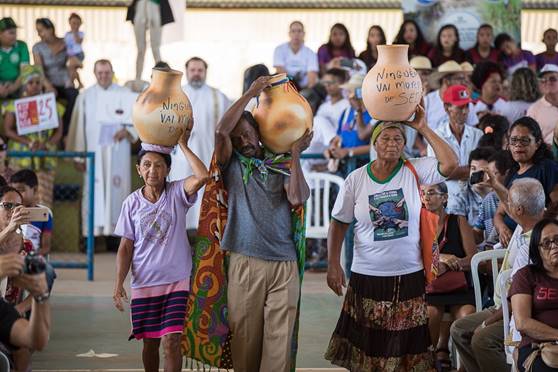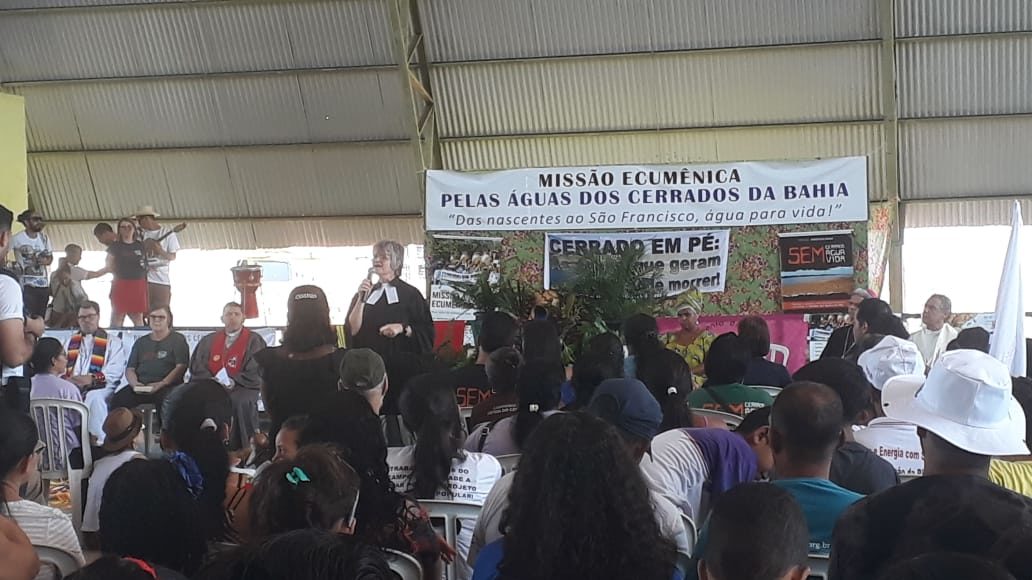Brazil is one of the most biodiverse countries in the world and contains 20% of the Earth´s water springs – but all this is threatened by the development model implemented in the countryside.
In the west region of Bahia, in the Northeast of the country, communities are feeling the effects of land and power concentration in their daily lives. The region is home for traditional communities and peasants who for generations lived from the land and water – fishing, harvesting, hunting or extracting local products, while preserving rivers and the cerrado vegetation. However, the arrival of agribusiness industries in the 1970s began a silent and dangerous war over land and water control.
This has reached high peaks two years ago, as around 1,000 people from the municipality of Correntina invaded a farm and damaged machines to denounce the abusive use of water by the property. Rivers were drying, and the population was going waterless – while public authorities refused to take any responsibility. For example, the whole population of Correntina uses approximately 3 million litres of water daily – which is only 2,8 per cent of the 106 million litres extracted from rivers every day by one single ranch. And worse, this is what the ranch has a legal permit to use, but there is no control to ensure they are not siphoning off even more water.
Situations like this were the subject of the ACT Alliance Brazil Forum Ecumenical Mission, which took place between 3 and 5October, coordinated by Ecumenical Coordination for Service (CESE). A group of 70 missionaries from churches, faith-based organisations, social movements and international development organisations including ACT members Christian Aid, Koinonia and FDL, gathered in the region. Their aim was to: show solidarity for the people of the region, raise awareness to the risks represented by the predatory use of rivers; sensitise churches, faith-based organizations and civil society on the care for our Common Home; demand action from the State to solve agrarian conflicts and protect rivers; and announce a new form of ‘living together’ in a society that respects traditional communities, livelihoods and natural resources as common goods.

During the three days, the mission had a public hearing with the state public prosecutor, visited communities affected by water droughts and illegal land grabbing, and held an ecumenical celebration, with clergy from different denominations and many of the local population participating. The ecumenical movement is a powerful channel to catalyse initiatives in defence of the poorest and most vulnerable populations in Brazil. In the current context, as basic rights and justice access are being dismantled by high authorities, it is the mandate of the ecumenical movement to raise the voice of those suffering the most and demand justice.
Below you can read the final statement of the mission.
ACT BRAZIL ECUMENICAL FORUM PUBLISHES OFFICIAL STATEMENT ABOUT ECUMENICAL MISSION
Let justice roll on like a river, righteousness like a never-failing stream -Amos 5.24 –
On 3 and 4 October in the west of Bahia, we, representatives of different expressions of faith, provoked by the Ecumenical Coordination of Service (Coordenadoria Ecumênica de Serviço: CESE) and with support from the ACT Brazil Ecumenical Forum, undertook the 5th Ecumenical Mission in order to provide national and international visibility to water-related conflicts.
Our mission was held during the days when we remember and celebrate the charisma of Francis of Assis, who recognized Mother Earth, our Pachamama, as a living being, deserving of affection, care and love. This spirituality, which understands that a human being is the smallest part of a complex web of life, is the force that sustains our missionary journey.
We were affected by the prophecy of denunciation at the public hearing from men and women who have suffered the impacts of an anti-democratic, capitalist system which denies traditional communities the right to exist.
The cries that we heard denounced the expansion of the tentacles of an exploitative system that transforms land and water into commodities, annihilating these two forces, which are expressions of the sacred for traditional peoples.
“All of us have the colour of the earth in our skin” remind these women, who suffer the impact of a development project that denies the right to exist of the many cultures that make up the Cerrado region of Bahia. All of us have the colour of the earth in our skin, which takes us back to our primordial ancestry – ADAM – he who is the colour of earth.
Shootings, land grabbing, harassment, the manipulation of information, the restriction of the right to come and go, pressure to leave your land, are all examples of the denounced violence. In Barreiras, Correntina, São Desidério, Serra Dourada and other municipalities we identified how agribusiness functions in the region and in many other territories around the nation, in an authoritarian, aggressive manner, incapable of coexistence with the diversity of creation.
Video: Environmental crime in São Desidério, Bahía, caused by construction of Baragem Itororó. Video: igimage
The dignity of those in this struggle, from the geraizeira (pastoralist), artisanal fishing and other traditional rural communities, provides the power that drives these communities’ capacity for resistance.
We do not want charity. We want our right to water and to maintain our traditional way of life. This claim contrasted with attempts by public agents to provide responses to demands within a context of the absence of the Democratic State and where the prevailing option is for an agrarian policy that does not recognize traditional ways of life.
Given everything that we heard and learnt, it is fitting to share some fundamental challenges for the region:
- That the public authorities secure land rights for traditional peoples, preventing agribusiness and its private militias from improperly appropriating land that is sacred to traditional peoples;
- That the competent bodies conduct research into the impact of toxic pesticides on the fish and food consumed by these communities;
- That they guarantee effective public oversight mechanisms for grant-making procedures;
- The urgent need to bring together different communities in order to draw up an agenda for common action.
Our cry is the cry of one of the rural workers at the public hearing: Have compassion for rural workers and have compassion for the Earth and the Waters!
“From the springs to the São Francisco River, water for life!”
Correntina, Brazil, October 2019.


